
The Stars of the Show
July 7th, 2010
Of all the avifauna of Outer Banks, none capture my heart like the Black Skimmers. Ternlike birds with striking, huge black and red bills, they fly low, dragging their oversized lower mandibles in the water. They're 16-20 inches perched, but in flight, they look a lot bigger than that, with a wingspan of up to four feet. The first time I saw one I couldn't believe my eyes.
On Sunday afternoon, three of them gave me an extended show at Pea Island salt marsh. They flew quite close to me as they circled around skimming the water, allowing me to snap dozens of pictures.
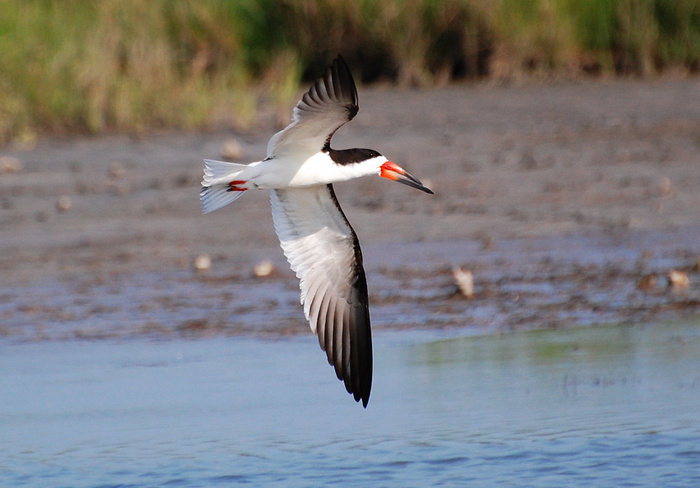
1680x1050 wallpaper
You can see this bird's strangest feature above--the lower mandible is about a third longer than the upper.
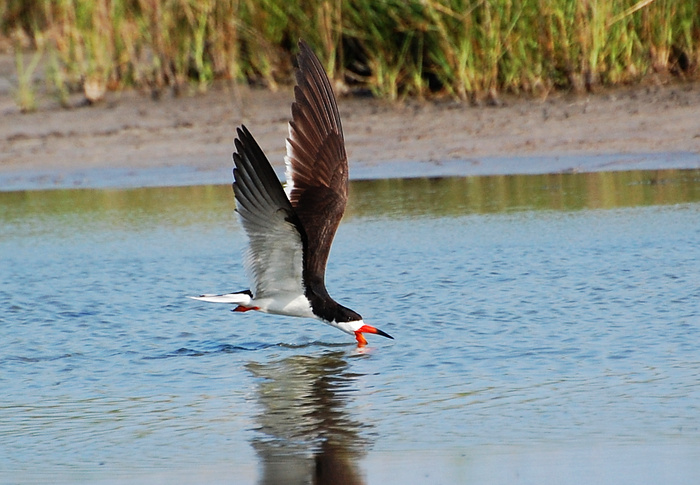
1680x1050 wallpaper
This is the classic skimmer posture. The lower mandible skims in shallow water feeling for fish and crustaceans. They'll fly along some distance like that, leaving a little wake behind them. I see them most often on salt marshes and sounds, but they also skim the ocean surf. (A few years ago a pair of them did that right outside our cottage!)

When they find food, they double their bills back to catch it.
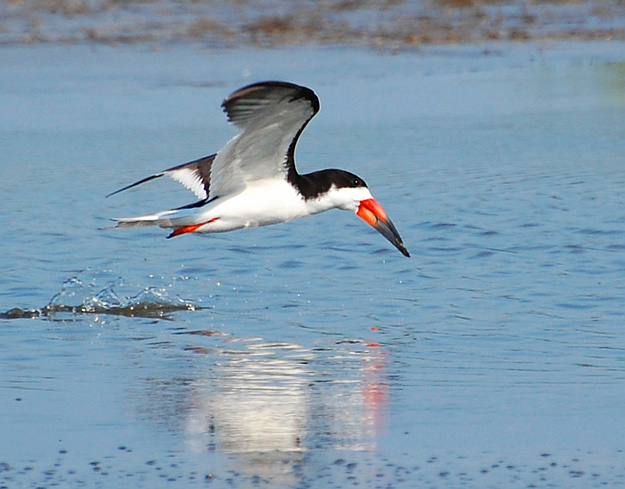

The one behind appears to be a juvenile: note the white collar and other imperfections of his plumage.
I'm back
July 6th, 2010

I return from vacation with ten zillion photos. And twice as many bug bites.
Oy vey, the ticks. Oy vey, the chiggers. What a relief to be back in a place where the bugs only bite you once then fly away. Instead of freaking colonizing you!
That aside, I had an awesome time at Outer Banks. The cottage was spacious and beautiful and comfy and oceanfront. The body boarding was great. The birding was out of this world. Between Virginia and Carolina I racked up six lifers. Bird photography in Virginia was of limited success, but at Outer Banks, all sorts of sea birds and a few song birds posed nicely for me.
Details to come. For now, my bed is calling.
Life Bird!
June 23rd, 2010
"I'm going hiking!" I announced.
"You're nuts," said my mom.
"You need your head checked," said my dad.
"Cuckoo!" said my husband.
"100F," said the thermometer.
Pshaw, I say. It's not so bad. You move slow, you drink lots. The body adapts. I grew up with this weather (generally in July and August, mind you, not June). It remembers.
Today I went exploring Swift Creek Trail, a forest road near where my parents live. If I followed it far enough I'd get to Swift Creek, where my brother went fishing and camping as a teenager. (There was a big puddle that used to form on the dirt road behind our house; it drained via a narrow channel into the woods and eventually into Swift Creek. My brother and I used to dam up the channel so the puddle got huge and then we'd play in it. And then we'd get in trouble because some guy lived back there and actually had to drive on that road. Ah, memories.) But today was not the day for a two-mile hike.
So I just went a ways down the gravel road, seeing what I could see. It made my day, my week, and heck, my entire month when I found a singing Prairie Warbler, a striking yellow-breasted bird with black flank streaks and "mustache", and my 220-somethingth lifer! I found him exactly the way I love to find new birds: unannounced and unexpected. This is one of the southeastern warblers that almost never occurs in Ottawa.
The other point of interest was a Summer Tanager, the cherry red bird that's a close cousin to our Scarlet Tanager. (Speaking of Scarlet Tanagers, we saw one of those at Shenandoah, along with two other "mountain specialties", Common Ravens and Slate-Colored Juncos. Those three northern birds breed nowhere else in Virginia but the mountains.)
My body handled it fine. I didn't even get a dehydration headache like I got after the last hike, where I didn't drink quite enough. There is, however, a small problem with ticks. The underbrush is teeming with them this summer: the little bitty ones that, IIRC, are the ones that transmit Lyme Disease. I've picked (or had picked) three off me so far.
The rest of the week will be eventful. Dutch Gap tomorrow, Busch Gardens on Friday, then off to Cape Hatteras for a week on Saturday.
Last fling before Virginia
June 15th, 2010
Went walking today, starting from Dominion Station and heading northeast along the river. This was a "this day's too beautiful to waste" walk, not a birding walk per se, but I brought along my binoculars on general principle.
I'm glad I did! I ended up at Champlain Bridge--I didn't realize the hike from Dominion to there was so short. This bridge is a nesting site for Cliff Swallows, probably the scarcest of Ottawa's six swallow species, certainly one I don't see every day. (These are the guys who, famously, "return to Capistrano"--although of late, those particular Cliff Swallows have relocated.) I'd heard about the colony but never come to see it before. I took a stairway up, and found that the bridge had both a bike lane and a pedestrian lane (have I mentioned I love my city?), so I followed along and watched for them. Ended up seeing quite a few flying back and forth, their pale buff-colored rumps (and sometimes their white forehead spots) clearly visible. From down on Bate Island, I was even able to see one of the rows of nests. They build them out of mud along the sides of the bridge.
On the bike path, a smell of carrion attracted a Turkey Vulture who, in turn, attracted the attention of several angry songbirds. (Not sure why they bother harassing a vulture...maybe he could prey on a nestling?) Yellow Warbler parents were busily carrying insects to their young. And at one point, on the ground, was a quite young but out-of-the-nest Red-Winged Blackbird. His head wasn't even fully feathered yet.
This will be my last outing before Virginia. We're leaving in three days, and I have lots to do before then.
A Dragonfly Quintet
June 14th, 2010
I'm starting to learn my dragonflies. At Stony Swamp last week, I saw five different species in one day.
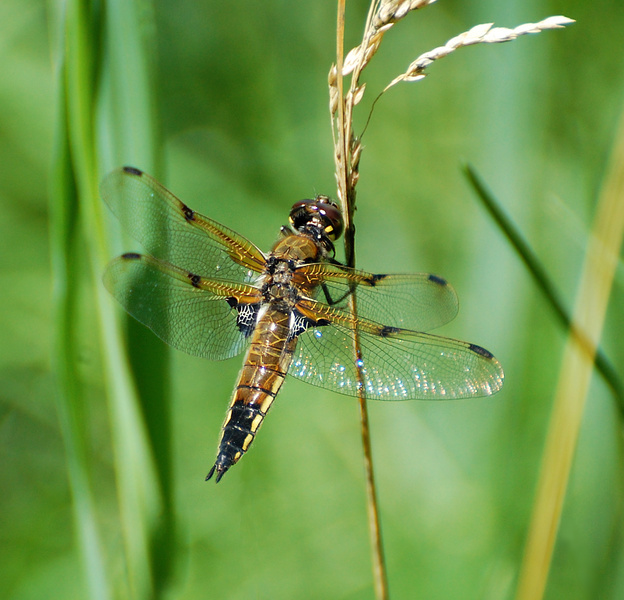
( More )
Stony Swamp Pix
June 13th, 2010
Increasingly, I'm using Old Quarry Trail as a starting point rather than a destination. That's the part of Stony Swamp that I can get to by bus. But the trails are all interconnected, so from there, given sufficient stamina, I can get just about anywhere.
I've been exploring trails 24 and 25 lately, along with bits of the Trans Canada and Rideau Trails, and loving what I'm discovering. Among other things, this area is a motherload for breeding Scarlet Tanagers. If you hear what sounds like a hoarse robin song--or a call like "chick-burr"--stop and scan the canopy. When you see something so red you can't believe your eyes, you've found it.
This is the time of year when bird photography becomes frustrating. Especially in the woods. Spring migration is over, and the birds are settled in to the business of nesting and rearing young. Most of them are staying hidden, or (like the tanagers) way up in the branches.
Fortunately, this is also the time of year when butterflies start coming out in droves!
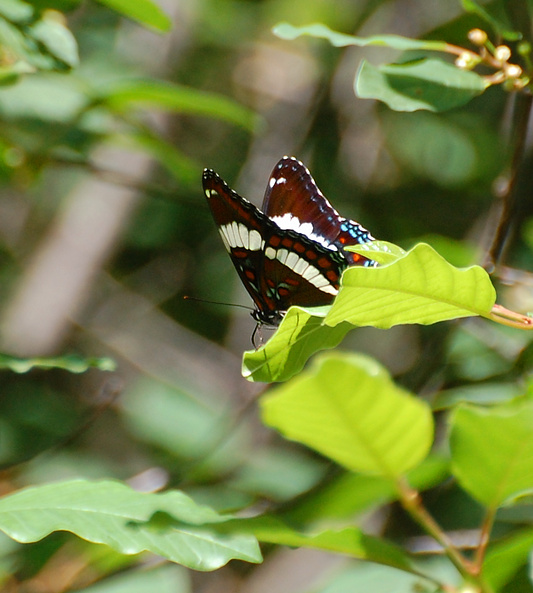
White Admiral
This female Rose-Breasted Grosbeak was cooperative, though.

1680x1050 wallpaper
As was this cardinal.

Three Odd Birds
June 3rd, 2010
Lesson learned: When wading through knee-deep grass in early morning shortly after the dispersal of morning mist, you might as well be wading through a swamp. Wear waterproof boots. Heck, wear waterproof pants!
That said, on to the pictures.

The area south of the airport is teeming with Bobolinks. I didn't realize just how many it supports until now (with spring migration completed). They and the meadowlarks duet from the open fields off High Road: the meadowlarks' wistful "see-yur"s and the bobolinks' resonant, almost electronic chatter. Those fields are fenced off, but now and then a bobolink or even a group of them perches on the fence, giving me a photo opportunity.
The meadowlarks, alas, do not perch on the fence. They don't even come close.
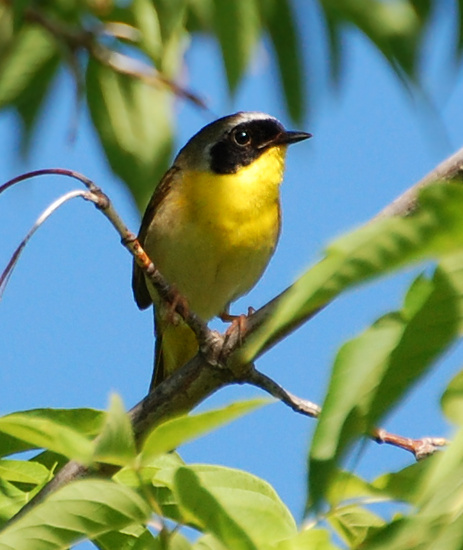
Investment: a half hour of wading through wet grass and weeds resulting in shoes, socks and jeans soaked to the skin. Payoff: my first good picture of a Common Yellowthroat!
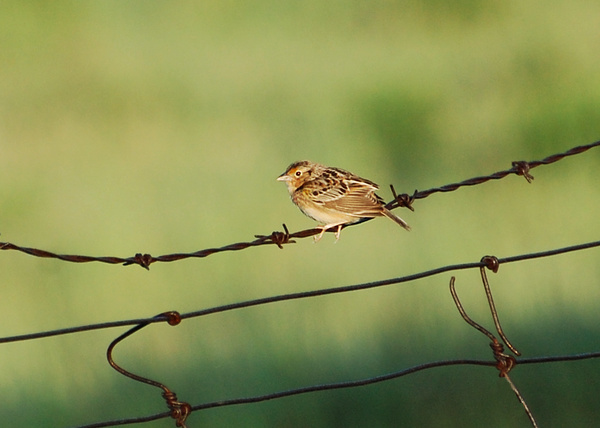
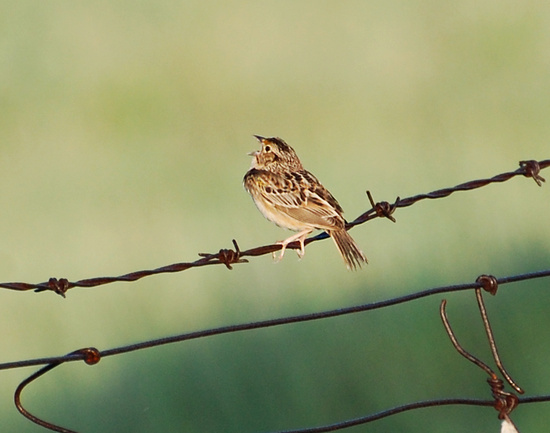
I got lucky when a Grasshopper Sparrow--usually a shy, secretive bird--chose to sing on the fence, and furthermore, let me get close enough for a few at least half-decent shots, before he vanished into the ether for the rest of the morning. The hunched appearance in the first picture is typical of this species, as is the spiky tail in the second.
Tiger Swallowtail
June 2nd, 2010
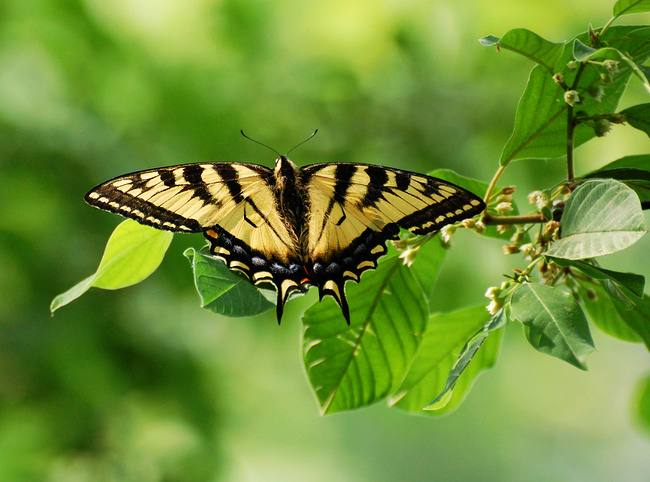
1680x1050 wallpaper
Hobomok Skipper
May 30th, 2010

1680x1050 wallpaper
Lovely pictures with a side of heat exhaustion
May 26th, 2010
Another Purple Martin shot from Tuesday.
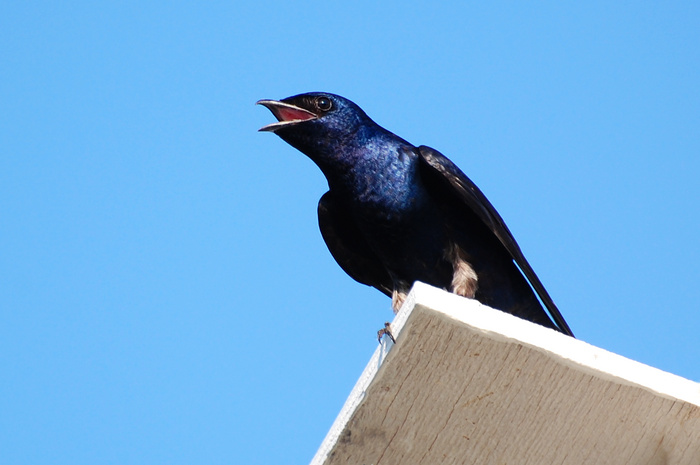
These beautiful birds are the largest swallows in North America, with flight skills second to none and a voracious appetite for insects. The mature males, as above, are all-over black with an indigo sheen. Females and young males (under two years of age) are light in front with variable splotching and streaking.
In the east, Purple Martins nest almost exclusively in manmade colonial nest boxes. The colony at Dick Bell Park (Nepean Sailing Club) is particularly large and well-managed. They band hundreds of nestlings every year.
Meanwhile, Andrew Haydon Park is overflowing with goslings. The older ones are starting to lose their yellow hue.
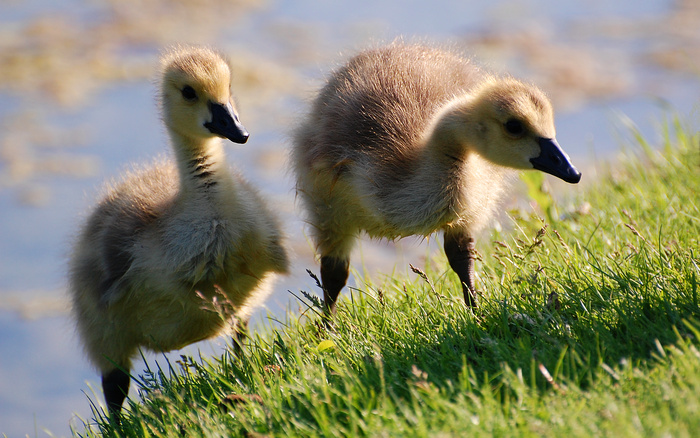
|
